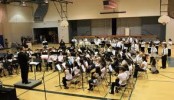 In writing a recent blog, inspired by Gustavo Dudamel’s orchestral version of a popular Puerto Rican band’s hit song, I began to muse on the subject of music education: in Venezuela and the U.S..
In writing a recent blog, inspired by Gustavo Dudamel’s orchestral version of a popular Puerto Rican band’s hit song, I began to muse on the subject of music education: in Venezuela and the U.S..
There are a million kids enrolled in Venezuela’s music system, called El Sistema. Some of them, like Gustavo Dudamel, rise to the top. Then there was the at-risk kid, Edicson Ruiz, who got off Caracas’ dangerous streets and joined El Sistema. He learned the bass from scratch and won an audition for the Berlin Philharmonic. No small feat. Watching Dudamel conduct the huge Simon Bolivar Youth Orchestra is truly inspiring. Classical music isn’t boring when played with that kind of energy and passion. And by kids no less, which makes it even better. And many of these kids were rescued from a life of crime and gang warfare. Sounds like a good idea for U.S. cities. Read More →
In writing a recent blog, inspired by Gustavo Dudamel’s orchestral version of a popular Puerto Rican band’s hit song, I began to muse on the subject of music education: in Venezuela and the U.S. What happened to it here in the U.S.? Why are the arts always the first to be cut during financial squeezes? Read More →
I recently received a couple of emails from an music aficionado friend with some links to a popular Puerto Rican group that had its hit song “Latinoamerica” (=Latin America) performed by an orchestra at the Latin Grammy Awards Ceremony. It’s not surprising the conductor was Gustavo Dudamel, Music Director of the Los Angeles Philharmonic.
It’s not surprising that “The Dude” would conduct a hit song with an orchestra….this was the Latin Grammies, after all. But I couldn’t imagine another conductor, say, Lukas Foss or Rafael Frubeck de Burgos, conducting this song.
The song, by the Puerto Rican group Calle 13, is listed as reggaeton, the new style ubiquitous in the Caribbean, but it’s actually more akin to nueva cancion, the movement in Latin America during the sixties that promulgated human rights and dignity, the same human elements that were being stripped away by dictators like Pinochet in Argentina and Somoza in Nicaragua.
Dudamel didn’t go to Juilliard or some classical conservatory to learn music. Read More →
 In writing a recent blog, inspired by Gustavo Dudamel’s orchestral version of a popular Puerto Rican band’s hit song, I began to muse on the subject of music education: in Venezuela and the U.S..
In writing a recent blog, inspired by Gustavo Dudamel’s orchestral version of a popular Puerto Rican band’s hit song, I began to muse on the subject of music education: in Venezuela and the U.S..